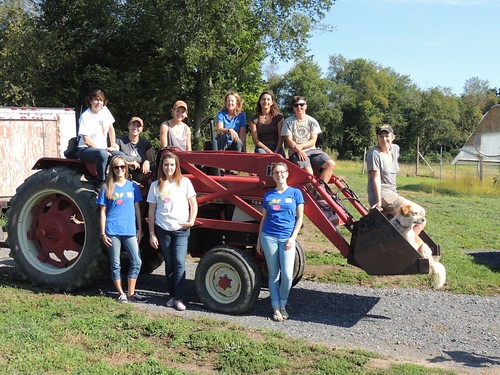By Graham Downey

Consumers expect a lot from local food. They want it to be fresh, healthy and raised responsibly. They want it to be affordable and convenient. And, they want their purchase to support local farmers. At first glance these goals seem at odds with each other. How can local food improve farmers’ bottom lines without being expensive? Is it possible to efficiently deliver local food to (mostly) urban consumers while still supporting (mostly) rural farm economies?
The answer may look something like Field Goods, an innovative food hub and social enterprise based in eastern New York State. Like other food hubs, Field Goods helps facilitate the connection between producer and consumer. By providing distribution and aggregation services, Field Goods helps reduce producers’ costs. And, for consumers, Field Goods delivers fresh, affordable and local products directly to workplaces – making it easier to support local producers.
Field Goods’ innovative supply chain is one very important piece of a new economic ecosystem fostered by the Hudson Valley Agricultural Development Corporation. As Todd Erling, Hudson Valley Agribusiness Development Corp. (HVADC) CEO, puts it, “Together we are working to build capacity and resiliency in the local food system. HVADC sees increasing progress in the development of a robust local food system, reinforcing our rural-urban community relationships by working to make the connections up and down the value chain with market based opportunities.”
Already Field Goods has had a tremendous impact on local economies in New York State. Over the last five years, and mostly in the last three, Field Goods has purchased more than $4 million in local products from over 80 different producers. By opening up new markets, Field Goods has made it possible for these producers to invest more in their community. For example, Field Goods’ suppliers report that they have been able to grow their operations’ acreage by an average of 183 percent. One farmer reports that he quadrupled his farm size from 10 to 40 acres thanks to Field Goods.
But, as Field Goods continues to grow its business in order to increase this impact, the complexity of its supply chain has also grown. Managing a supply chain is a daunting task on its own. And, because Field Goods is committed to supporting smaller local producers their supply chain will become exponentially more complex as their business grows.
To help manage this complexity, Field Goods applied for a USDA Agriculture Marketing Service (AMS) Local Food Promotion Program (LFPP) grant and in 2014, Field Goods became one of AMS’ first LFPP recipients. Congress created LFPP in the 2014 Farm Bill as a sister program to the AMS Farmers Market Promotion Program to, in general, be used for intermediary supply chain activities that support local marketing, including aggregation, processing, storage and distribution. Field Goods used its two-year, $50,000 LFPP grant to pioneer a new piece of software it calls “In The Field.”
This software will help Field Goods maintain and even improve its relationships with producers by making collaboration easier. These relationships are essential to Field Goods’ success because their model relies on trust and cooperation. As Donna Williams, Field Goods’ founder, puts it, “I have never encountered an industry that is more collaborative. We really mutually need each other, and when we have a problem, farmers try to find a way to help us solve it.”
Field Goods’ commitment to New York’s farmers, in tandem with Donna’s drive and managerial skills have earned Field Goods the trust of local producers and consumers. In The Field helps build that trust.
In The Field is a web-based application that allows producers to more easily share information, such as crop availability and desired price, and it makes it possible for Field Goods to manage orders and request specific products. By reducing the costs of managing the supply chain and increasing transparency, this new tool lets Field Goods continue to partner with a broad range of local producers even as they scale up the business.
In short, this new application helps Field Goods multiply their impact on the local economy.
Support for In the Field is just one example of the many ways USDA works to create market opportunities for U.S. producers, while increasing consumers’ access to healthy food and revitalizing rural economies. The Know Your Farmer, Know Your Food initiative coordinates a USDA-wide effort to carry out President Obama’s commitment to strengthen local and regional food systems. More information on the initiative, including an interactive map of local food projects across the country, can be found at www.usda.gov/knowyourfarmer.
Source:usda.gov